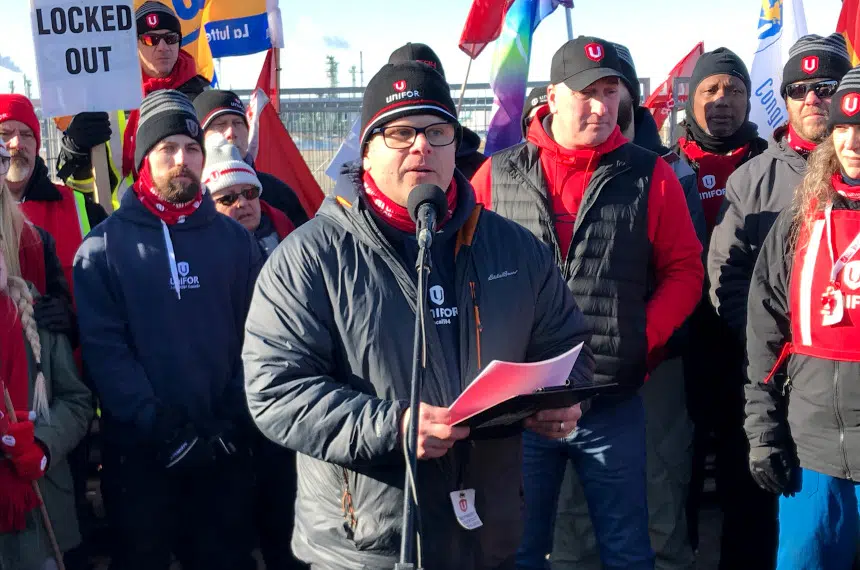Kevin Bittman is still shaken.
Bittman, the president of Unifor Local 594, can’t understand why no one from his union was told a letter had been received in February in which someone threatened to blow up Unifor’s blockades at the Co-op refinery.
The letter went to Regina Mayor Michael Fougere and the Saskatchewan Ministry of Justice on Feb. 18 and was forwarded to the Regina Police Service on Feb. 19.
The union found the letter three months later after a Freedom of Information request for communication between Fougere and the police.
“It has got a lot of people really stirred,” Bittman said. “We’re on the lines every day and we get told where to go and what people are going to do to us and on social media, but this was another level.
“(It was) pretty descriptive, that the bombs were actually planted and they could remotely detonate it — and to not be told about that, it really puts people into a stir.
“We’ve had our families on the picket lines. We had family fun days on the picket line. It’s very disturbing that we were never told about it or never even informed that this (threat) came in.”
The union and Federated Co-operatives Limited (FCL) have been involved in a bitter labour dispute for months. The refinery locked out the employees Dec. 5 in response to the union filing strike notice.
The dispute included blockades at the refinery gates that were deemed illegal by the courts and subsequently removed.
In the letter, the authors give the Regina police and the RCMP a week to remove the blockades. If they aren’t dismantled, the authors — who infer they’re farmers upset with fuel shortages caused by the blockades — say they’ll destroy the impediments like they destroy beaver dams on their farms.
The writers say they’ve already put “special mixes” in the blockades and can detonate them remotely.
“It was definitely more than just, ‘We’re going to get you,’ ” Bittman said. “It definitely went into describing how they were going to blow us up and what was going to happen.
“For us, we correlate that to if that ever happened at a school or somewhere, is that the response (from authorities) that would have happened? I guarantee not.”
During a media conference Tuesday, Chief Evan Bray explained the Regina Police Service’s reasoning for not informing the union, the refinery or the public about the threat.
Bray said the police arrived on the scene Feb. 7 and were there 24 hours a day seven days a week to monitor the union’s picketing and the operation of refinery.
When the police saw the letter, they started an investigation immediately — but Bray noted officers had been on the scene since Feb. 7, so the threat wasn’t deemed to be credible.
“This letter talks about the need for the blockades to come down; the blockades were down at that time,” Bray said. “So while the investigation into the letter was happening, our police service was on scene and had been on scene at the refinery for quite some time.
“We were very confident around what was at the gates (and) the people who were there. We were having constant communication with the Unifor members who were on scene at the refinery through this.”
Even so, the police subsequently didn’t tell the union members — or Unifor national executives, who also were threatened — about the letter.
“If we could do it again, I think we would have communication just to let them know … that we received a letter (and) we did an investigation,” Bray admitted.
The chief said Canada Post helped the police in the investigation as they tried to track down the authors. Those attempts weren’t successful, prompting Bray on Tuesday to ask for the public’s assistance in identifying the source of the threat.
Bittman said the union gets threats all the time, but this one is the most alarming one yet.
“We would have handled things way differently if we had known that this threat was in,” he said. “We could have taken some precautions and put some things in place. But when you don’t know, it’s very scary that we could have had a major incident. It’s not right that we were kept out of the loop.”
While Unifor has called on the provincial government to enact binding arbitration, those requests have been rebuffed. A special mediator was appointed, but the company refused to accept his recommendations.
Now, the lockout is well into its fifth month.
“The tensions are running high,” Bittman said. “We’re just exercising our right to picket, but every day on social media and in the news, you’ve got farmers who are threatening to run us over.
“This needs to end.”
— With files from 980 CJME’s Britton Gray and 650 CKOM’s Chris Vandenbreekel












